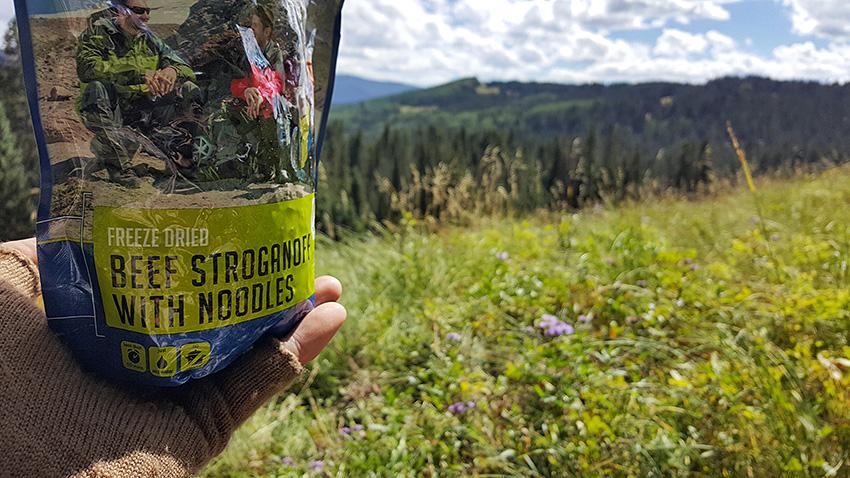
You’ve trained all year, did all your research, drew your tag, and have the latest gear — it’s finally time to leave civilization behind for that backcountry hunt. As you strap your pack on at the trail head you’ve got just enough food provisions to last for the duration of your hunt. How much thought did you put into what you packed to fuel your body during this rigorous and non-stop adventure? Did you just order the run of mill freeze dried backpacking meal and call it good, or did you actually consider what your body needs for a week of hardcore ground pounding?
There are three macronutrients as basis for most diets: carbohydrates, protein, and fat. Here is some good advice right up front — eat complex carbohydrates, stay away from simple sugars, fat is your friend, and protein is essential. Everybody always talks carbs for energy (which is true), but fat is also a fuel source. And fat has the benefit of being “slow burning” and providing sustained energy. Look at it this way, if you eat a bunch of quick burning carbs and you blow through them during your early morning hike to your honey hole, what is the next thing your body will begin burning? Fat. If there is no fat readily available, then your body will essentially begin eating itself and target sources of protein. Those muscles you worked so hard in the off season to build, the ones you will need to pack that elk out after a successful hunt — certainly you want to keep those. So let’s dive just a bit deeper.
To learn more on this topic, listen to Episode 40 of the Hunt Backcountry Podcast after you finish this article. You can also save 10% on Heather’s Choice Meal, which we discuss in the podcast, by using coupon code EXOMOUNTAIN at HeathersChoice.com
Fat as an Energy Source
Fat is an extremely concentrated source of energy when compared to carbs or protein. Actually, it carries more than double the calories (9) per gram than carbs or protein (4). And remember, calories are fundamentally units of energy. So you can begin to see why fat can really be advantageous during an extended hunt. I’m not saying to go overboard with fat on a daily basis, but during extreme endurance activities it definitely gives you more bang for the buck. And as an added bonus, a diet higher in fat content will provide more calories-per-ounce, which will lighten your pack. Another advantage of fat is that your body digests it slowly, therefore taking longer to convert to usable energy. I translate this to meaning that your body naturally paces itself by slowly converting fat to fuel. A few other notables regarding fat is that it allows for better absorption of essential vitamins (A, D, E, and K). Too little fat can inhibit optimal brain function (who doesn’t want to bring their A game on a hunt?), and it will at least make you feel a little more satisfied even though you’re probably burning through way more calories than you’re ingesting. In order to get these fats, don’t shy away from nuts, seeds, coconut, meats, fish, peanut butter, and my two personal favorites, cheese and sausage.
Protein is Essential for Recovery
You totally destroy your muscles during a day of mountain hunting, and eating adequate amounts of protein to repair them is imperative for day-in and day-out performance. During the preseason you were trying to get 1-1.5 grams of protein per pound of lean body weight to recover from your 1 – 1 ½ hour workouts. Now your workout is around 12 hours, so you can imagine how hungry your muscles and connective tissue will be during your hunt. If you want to perform for the duration of an extended hunt, you need get substantial amounts of protein into your daily backcountry diet. I would shoot for 2 grams per pound of lean body mass, which may not be possible due to weight limitations, but you should certainly pack in as much as you can. You can always bring along some protein powder to help supplement your meals and snacks as a way to sneak in a few extra grams of muscle repairing magic.
Now for the Carbs
Carbs are no doubt your body’s first choice for energy due to the body’s ability to easily convert them into usable energy. Remember, though, that there are two types of carbs — simple and complex. In general, we want to steer clear of simple carbs, which will give you a quick boost but drop off like a rock after a short period of time. If you are really dragging and have a short-term end goal in sight, then perhaps you can reach for the candy bar, but in general you want to pack complex carbs for your hunts. The main reason complex carbs are advantageous is that they are processed more slowly by your body and will deliver sustained energy over a longer period of time. Another plus for packing the complex carbs into your wilderness pantry is that you would rather your body burn them than the precious protein that it will need to repair those muscles and important body tissue you just put through a meat grinder. You’ll want to target meals that contain oats, buckwheat, sweet potatoes, chia, beans, and green veggies.
In Summary
You really need to put some serious thought into the food and meals you pack along with you into the field. Taking a package of Pop-Tarts for breakfast, a candy bar for lunch, and some freeze dried spaghetti for supper isn’t being fair to yourself after all the effort you put in to getting to this point. You really need to look into some of the more specialized and health-conscience dehydrated or freeze dried meal companies out there to get the right fat and protein content, along with the complex carbs. You’re also going to want to pack snacks of jerky, nuts, and protein bars to keep your body functioning at the high level you need it to. Lastly, I haven’t mentioned it up to this point, but you have absolutely got to remain hydrated. Keep drinking water and your engine will keep firing on all cylinders. You’re going to be pushing your mind and body to its limits to bag that trophy of a lifetime, so fueling for sustained performance is imperative.
Shawn is the owner of HuntingFit.com, a website built to prepare you to be successful during your hunting adventures. He has hunted all across the United States including whitetails in the brush country of South Texas all the way up to Lake Superior in Wisconsin as well as chased elk in the Rockies and bear in the Appalachians. He believes strongly that fitness and nutrition are not only key to being a successful hunter but also very important to maintaining a happy and healthy life. You can check out HuntingFit.com or follow along on Facebook, Twitter, and Instagram.
